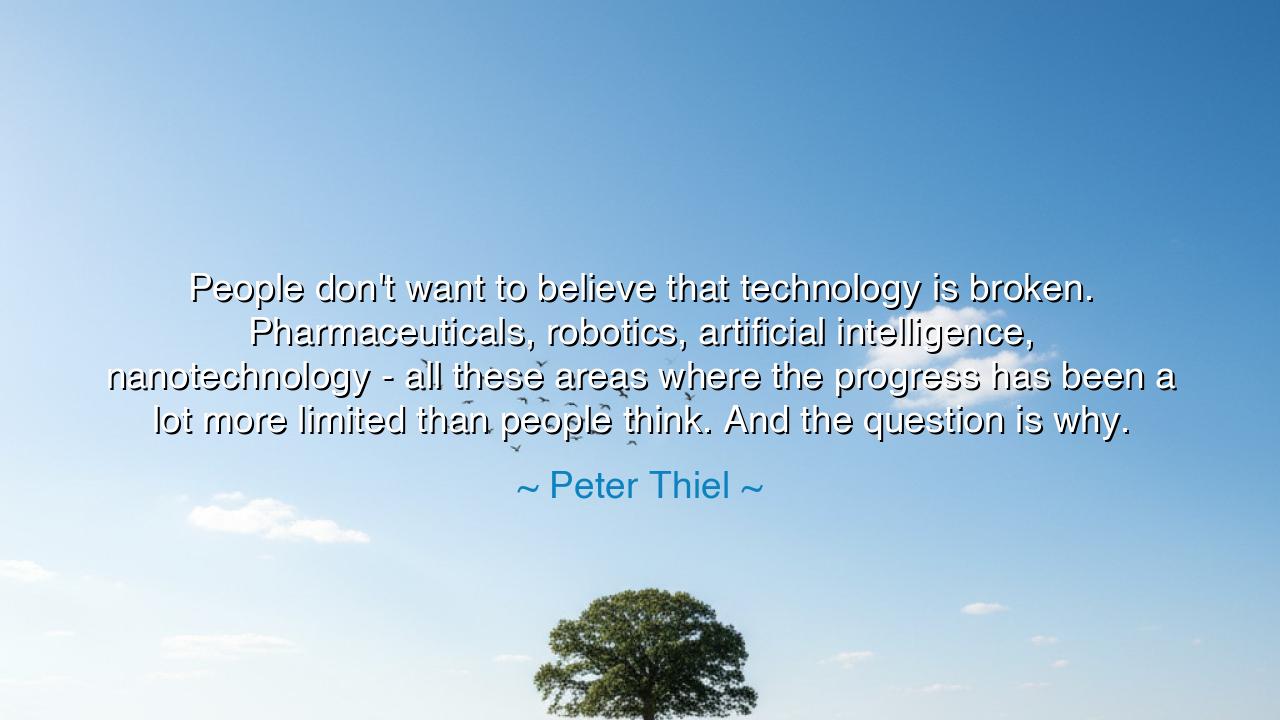
People don't want to believe that technology is broken.
People don't want to believe that technology is broken. Pharmaceuticals, robotics, artificial intelligence, nanotechnology - all these areas where the progress has been a lot more limited than people think. And the question is why.






In these sobering and visionary words, Peter Thiel pierces through the illusion of progress: “People don’t want to believe that technology is broken. Pharmaceuticals, robotics, artificial intelligence, nanotechnology — all these areas where the progress has been a lot more limited than people think. And the question is why.” Here speaks not merely an entrepreneur but a philosopher of the modern age — one who dares to question the myth of unstoppable advancement. His message is not one of despair, but of awakening: that mankind, in its pride, mistakes movement for meaning, and noise for evolution. Thiel’s voice echoes through the digital storm, calling us to look beneath the glitter of innovation and ask whether our spirit of creation has dimmed.
There was a time when technology carried the fragrance of wonder. When the first steam engine roared to life, humanity felt it had conquered the limits of nature. When the first airplane rose into the skies, men saw the dream of Icarus redeemed. When penicillin was discovered, it was as if death itself had been delayed. These were not just inventions — they were miracles of imagination, born from courage, sacrifice, and vision. But in the centuries that followed, the rhythm changed. Our machines became faster, smaller, louder — yet our sense of purpose grew quieter. Thiel’s lament is a call to remember that true progress is not the accumulation of devices, but the elevation of the human condition.
Indeed, much of what we call innovation today is incremental, not transformative. Our smartphones are temples of distraction. Our medical industries drown in bureaucracy and profit. Our so-called artificial intelligence mimics the mind but does not yet grasp meaning. Our nanotechnology dreams, once promised as a revolution of healing, remain bound by the chains of complexity. Humanity has gained the power to simulate genius, yet often lacks the will to think deeply. The problem is not that our tools have failed us — it is that we have begun to serve our tools instead of commanding them.
Consider the story of the Apollo Program — the ancient modern epic of mankind’s ascent to the moon. In the 1960s, engineers, scientists, and dreamers, with technology primitive by today’s standards, accomplished what seemed divine. A human being stood upon another world, and for a brief moment, all nations looked upward together. Yet decades later, though our computers are a thousand times more powerful, we have lost the will to reach beyond the sky. Our progress has become horizontal — spreading convenience, not vertical — reaching toward transcendence. Thiel’s question, “why,” is the cry of a generation wondering where its fire has gone.
The answer lies in fear and complacency. Modern humanity has traded vision for comfort, risk for regulation, invention for iteration. The ancients, though they lacked machines, possessed something we have lost — the audacity to imagine the impossible. When Da Vinci sketched flying machines, when Newton saw the universe in an apple’s fall, when Curie held glowing radium in her hands, they acted not for wealth, but for wonder. Today, the spirit of innovation often bends under the weight of institutions, politics, and profit. The brokenness of technology is not mechanical; it is moral. It reflects a fracture in our collective imagination.
And yet, all is not lost. Every age of stagnation holds within it the seed of renewal. Thiel’s words are a summons — to rekindle the flame of purposeful invention. If our technologies no longer astonish the soul, then it is time to build anew. Let the young remember that science was once poetry, that invention was once prayer. Let the creators of this century dare to dream again, not only of smarter machines, but of a wiser civilization. For the greatest innovation is not in what we make, but in how we think, how we live, and how we hope.
So, my child, take this lesson to heart: never mistake progress in machinery for progress in meaning. Question the glittering surface of advancement, and seek the truth that lies beneath. Build with intention, invent with integrity, and pursue knowledge not for power, but for the healing of mankind. The world does not need more gadgets — it needs visionaries. For when technology once again serves wisdom, when progress is guided by conscience, then the engines of humanity will rise once more — not merely toward the stars, but toward eternity itself.






AAdministratorAdministrator
Welcome, honored guests. Please leave a comment, we will respond soon